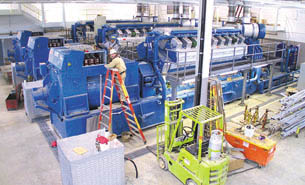New Midfield Terminal gets new power plant, too
Date Posted: March 16 2001
In Michigan, deregulation of electrical utilities hasn't brought the rolling blackouts and brownouts like they had earlier this year in California, but voracious consumers of electrical power are taking matters into their own hands to make sure that doesn't happen - at least to their own business.
In the last two years, some 500 megawatts of additional power have been put on line in Michigan, in the form of small "peaking" power plants that serve a specific customer or only come on during high-load periods. One such smaller plant that will fire up later this year is at Wayne County's Metro Airport, where the new 2 million-square-foot Midfield Terminal will have its own electrical generation plant - a rarity among the nation's airports.
"We've been very pleased with the work we've seen," said Glenn Keates, chief electrical engineer for Cummins and Barnard, a consulting engineer on the project. "You can tell the difference when you have a professional workforce. This group has been excellent to work with." Pipe Systems has acted as the general contractor and the mechanical contractor on the project.
The Midfield Terminal Energy Center will not only be able to produce 17.28 megawatts of electricity, it will also be able to provide 140 million BTUs of hot water heat to the terminal and an adjacent hotel, and offer 9,200 tons of cooling capacity. The plant could provide a small city of 3,500 homes with heating, cooling and electricity.
Operators of the plant will be able to take advantage of the rapidly changing energy market, having the ability to either buy all the needed electricity or generate electricity, depending on which presents the best value. The plant's three generators will be fired by natural gas, as will the plant's three boilers, which will provide 300-350 degree hot water to heat the terminal.
Cooling will come from centrifugal chillers. As a backup, the boilers can be fired by the ready supply of jet fuel, of all things, and an emergency generator for the plant will be online in the background.
"The biggest thing we worry about out here is the reliability factor," Keates said. "We just can't do without electricity, heating and cooling capacity."
The construction of the electrical side of the 25,000 square-foot powerhouse is being managed by Ferndale Electric. Last week, much of the work centered on setting up the three 5.76 megawatt, 10,000 horsepower generators, which were installed last December. General Foreman Keith Koch II said the process is right on schedule. "We'll be ready when the terminal opens," he said. "We've met every milestone so far, and the workmanship and professionalism among the workers has been great."
The Midfield Terminal project received its share of bad press recently with the disclosure that the baggage handling system is behind schedule, and there are undoubtedly some other difficulties, but the vast majority of the $1.2 billion project is going well, thanks to the ingenuity and skill of the people involved.
"It's gratifying to witness the professionalism and craftsmanship of the Michigan-based contractors on the powerhouse and other Midfield projects," said IBEW Local 58 BA Ed Kohler.
"Sometimes owners look for cheaper and faster means to accomplish certain goals, but the end results seem to be more costly and more chaotic. Thanks again to all our Michigan-based crafts."Michigan Consolidated Gas Co. and DQE Energy Services will operate the plant under the name Metro Energy, LLC. Operations Manager Dave Kiselewski said the energy production available with the plant will take some of the load off the power grid. "Edison's happy, and we're happy, it's good for everybody," he said.
Detroit Edison spokesman Guy Cerullo said there has been a trend in recent years of more companies building "distributed generation" plants - which only produce power mainly for a specific business - as well as the peaking plants. The plant at the Midfield Terminal fits into both categories.
"Most of those that are being built are small gas-fired plants, and they can afford to operate only during peak periods and sell their power," he said, "although there also some medium sized 300 to 800 megawatt plants that have been built. It's a wide open marketplace and there is a need for electrical generation."

THREE NEWLY-INSTALLED generators will provide power to the Metro Airport Midfield Terminal. Installing primary cable are IBEW 58 members Steve Louzon and Jeanette Calwell of Ferndale Electric.
